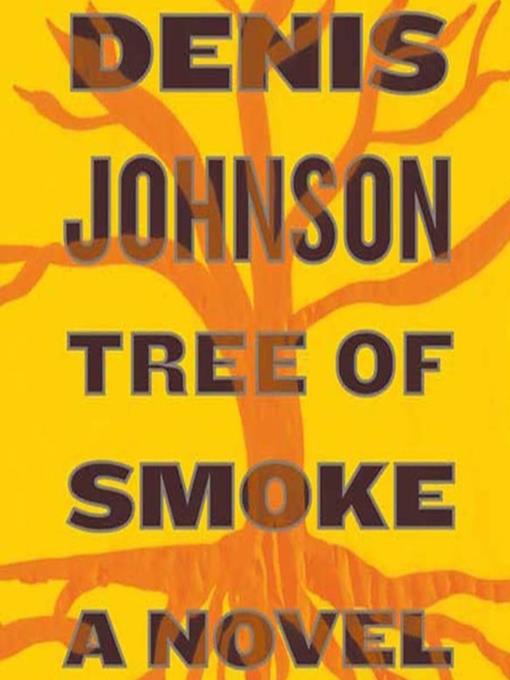
Tree of Smoke
A Novel
کتاب های مرتبط
- اطلاعات
- نقد و بررسی
- دیدگاه کاربران
نقد و بررسی

Will Patton delivers Denis Johnson's elegant, earthy, excruciating reflections on the war in Vietnam. Patton is outstanding as he narrates the story of Skip Sands, a CIA spy for "history's greatest nation" in Vietnam in the '60s, just before the Tet Offensive. Johnson's writing sings with truth, poetry, humor, and desperation; the story is as unsentimental and uplifting as it is horrific and painful. Patton's performance is quiet, powerful, and gut-wrenching. He hurls listeners directly into a tangle of young men "on the cutting edge of reality itself, right where it turns into a dream," and moments before dream becomes nightmare. This is must listening. Without being preachy, Johnson's novel clarifies any lingering confusion about that period in our recent history, both at home and in Southeast Asia. S.J.H. Winner of AudioFile Earphones Award (c) AudioFile 2008, Portland, Maine

Starred review from June 25, 2007
Signature
Reviewed by
Michael Coffey
If this novel, Johnson's first in nearly a decade, is—as the promo copy says—about Skip Sands, it's also about his uncle, a legendary CIA operative; Kathy Jones, a widowed, saintly Canadian nurse; Trung, a North Vietnamese spy; and the Houston brothers, Bill and James, misguided GIs who haunt the story's periphery. And it's also about Sgt. Jimmy Storm, whose existence seems to be one long vision quest. As with all of Johnson's work—the stories in Jesus' Son
, novels like Resuscitation of a Dead Man
and Fiskadoro
—the real point is the possibility of grace in a world of total mystery and inexplicable suffering. In Johnson's honest world, no one story dominates.
For all the story lines, the structure couldn't be simpler: each year, from 1963 (the book opens in the Philippines: “Last night at 3:00 a.m. President Kennedy had been killed”) to 1970, gets its own part, followed by a coda set in 1983. Readers familiar with the Vietnam War will recognize its arc—the Tet offensive (65 harrowing pages here); the deaths of Martin Luther King and RFK; the fall of Saigon, swift and seemingly foreordained.
Skip is a CIA recruit working under his uncle, Francis X. Sands, known as the Colonel. Skip is mostly in the dark, awaiting direction, living under an alias and falling in love with Kathy while the Colonel deals in double agents, Bushmills whiskey and folk history. He's a soldier-scholar pursuing theories of how to purify an information stream; he bloviates in gusts of sincerity and blasphemy, all of it charming. A large cast of characters, some colorful, some vaguely chalked, surround this triad, and if Tree of Smoke
has a flaw, it is that some characters are virtually indistinguishable. Given the covert nature of much of the goings-on, perhaps it is necessary that characters become blurred. “We're on the cutting edge of reality itself,” says Storm. “Right where it turns into a dream.”
Is this our last Vietnam novel? One has to wonder. What serious writer, after tuning in to Johnson's terrifying, dissonant opera, can return with a fresh ear? The work of many past chroniclers— Graham Greene, Tim O'Brien, the filmmakers Coppola,Cimino and Kubrick, all of whom have contributed to our cultural “understanding” of the war—is both evoked and consumed in the fiery heat of Johnson's story. In the novel's coda, Storm, a war cliché now way gone and deep in the Malaysian jungle near Thailand, attends preparations for a village's sacrificial bonfire (consisting of personal items smashed and axed by their owners) and offers himself as “compensation, baby.” When the book ends, in a heartbreaking soliloquy from Kathy (fittingly, a Canadian) on the occasion of a war orphan benefit in a Minneapolis Radisson, you feel that America's Vietnam experience has been brought to a closure that's as good as we'll ever get.
Michael Coffey is
PW's executive managing editor.

September 3, 2007
Patton is a fine character actor. His performances in A Mighty Heart and Inventing the Abbotts made a notable presence in otherwise unremarkable roles. His reading of Johnson\x92s baroque Vietnam novel, though, will probably not feature highly in future editions of his résumé. Johnson\x92s tale of shadowy soldiers and spooks irrevocably changed by the unending war in Southeast Asia is rendered by Patton in a drill sergeant\x92s muscular whisper, complete with carefully rendered impressions of characters\x97American, Filipino and Vietnamese\x97some of which verge on parody. The effort and thought put into his reading is clear, but the results are underwhelming, bordering on unpleasant. Twenty-three hours of so mannered a performance begins to grate on the nerves, distracting from Johnson\x92s otherwise engrossing novel. Simultaneous release with the FSG hardcover (Reviews, June 28).

























دیدگاه کاربران